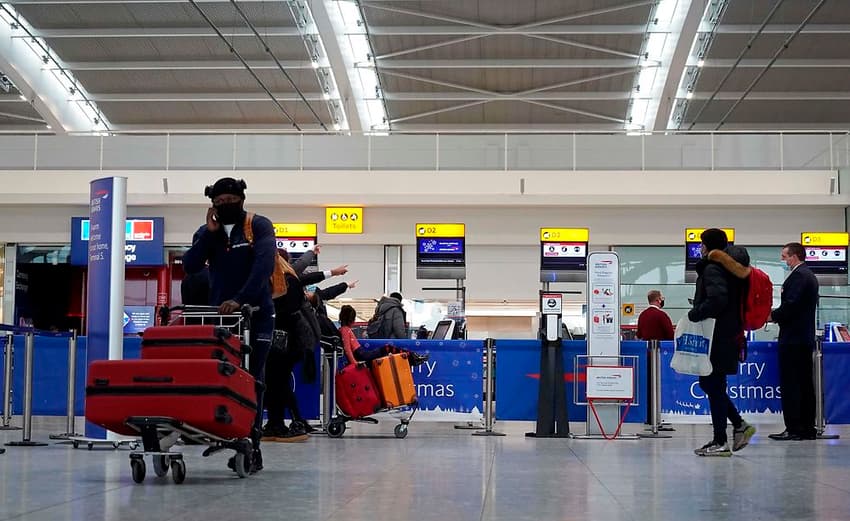Denmark extends ban on flights from UK due to Covid-19 mutation

Denmark's ban on incoming flights from the UK has been extended until midnight on Christmas Eve, the transport ministry has confirmed.
All passenger flights from the United Kingdom to Denmark were temporarily suspended two days ago due to the discovery of a faster-spreading variant of Covid-19 in southeastern England.
The initial 48-hour ban has now been extended to midnight on December 24th, the Ministry of Transport and Housing said in a statement.
The decision was taken in order to “limit the risk of the spread of infection with a new mutation (of coronavirus)”, the ministry said.
“The government is following the situation closely. There is currently a lot of uncertainty about the new mutation and over the extent to which travellers from England over Christmas would comply with a recommendation to isolate for 10 days,” transport minister Benny Engelbrecht said.
“On that basis, it is the recommendation of health authorities that we maintain a flight ban and we are therefore extending the current ban by over one and a half days,” Engelbrecht added in the statement.
A travel ban applying to residents of the UK is to be issued by the Ministry of Justice and will take effect on 25th December the justice ministry has confirmed. British citizens and other people travelling from the UK who are resident in Denmark will be allowed to enter.
READ ALSO: Denmark to introduce UK travel ban but will allow residents to return
The new variant of the coronavirus is believed to have first appeared in the London and Kent areas of the UK in September, and is reported to be up to 70 percent more contagious than other strains. But based on what scientists know so far, the variant does not appear to cause more serious illness than other kinds of coronavirus.
The variant was cited by British Prime Minister Boris Johnson as the reason behind last-minute changes to health restrictions in London and South East England, announced on Saturday, which have seen thousands of people unable to travel as planned over Christmas.
France, Germany, Italy, Norway, Sweden and Ireland have all also suspended flights.
READ ALSO: EU says blanket UK travel ban should end to allow people to return home
Comments
See Also
All passenger flights from the United Kingdom to Denmark were temporarily suspended two days ago due to the discovery of a faster-spreading variant of Covid-19 in southeastern England.
The initial 48-hour ban has now been extended to midnight on December 24th, the Ministry of Transport and Housing said in a statement.
The decision was taken in order to “limit the risk of the spread of infection with a new mutation (of coronavirus)”, the ministry said.
“The government is following the situation closely. There is currently a lot of uncertainty about the new mutation and over the extent to which travellers from England over Christmas would comply with a recommendation to isolate for 10 days,” transport minister Benny Engelbrecht said.
“On that basis, it is the recommendation of health authorities that we maintain a flight ban and we are therefore extending the current ban by over one and a half days,” Engelbrecht added in the statement.
A travel ban applying to residents of the UK is to be issued by the Ministry of Justice and will take effect on 25th December the justice ministry has confirmed. British citizens and other people travelling from the UK who are resident in Denmark will be allowed to enter.
READ ALSO: Denmark to introduce UK travel ban but will allow residents to return
The new variant of the coronavirus is believed to have first appeared in the London and Kent areas of the UK in September, and is reported to be up to 70 percent more contagious than other strains. But based on what scientists know so far, the variant does not appear to cause more serious illness than other kinds of coronavirus.
The variant was cited by British Prime Minister Boris Johnson as the reason behind last-minute changes to health restrictions in London and South East England, announced on Saturday, which have seen thousands of people unable to travel as planned over Christmas.
France, Germany, Italy, Norway, Sweden and Ireland have all also suspended flights.
READ ALSO: EU says blanket UK travel ban should end to allow people to return home
Join the conversation in our comments section below. Share your own views and experience and if you have a question or suggestion for our journalists then email us at [email protected].
Please keep comments civil, constructive and on topic – and make sure to read our terms of use before getting involved.
Please log in here to leave a comment.